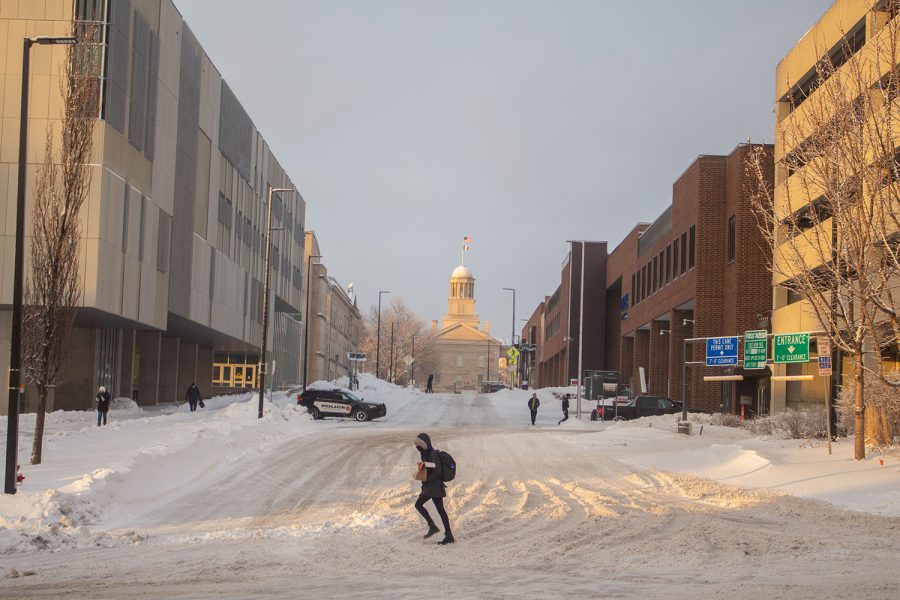Opinion | Alternatives to driving may save the Earth
As summer comes to a close and more students return to Iowa City, carpooling, using public transport, and relying on walking can help ease traffic and parking-related concerns around campus.
Several students are seen walking on the University of Iowa campus on Feb. 4 after a snowstorm rolled through earlier that day.
July 28, 2022
College students are returning to Iowa City as the last days of summer fly by. With the fall semester approaching, a seemingly unsolvable problem has resurfaced: limited parking and high traffic around campus.
However, traffic and lack of parking during the academic year in Iowa City is so much more than a social or time aggravation. In 2020, 27 percent of carbon emissions in the United States were due to passenger vehicles. Unfortunately, electric scooters and other one-person vehicles are not the environmentally friendly solution to this problem as they may first appear to be.
Air pollutants, including carbon dioxide release, are associated with decreased air quality. Across the state, Iowa’s air quality is currently rated at the highest, least polluted level. It will take a group effort to preserve the state’s environment for our collective health and safety.
In warmer months, walking is always an environmentally friendly option. While this may take more time in the day, extra minutes in your daily commute contribute to saving the planet.
If walking is not feasible for the distance you have to travel to get to class or work, Iowa City is widely recognized as a Bike Friendly Community. Bikes have two small tires, which means less pollution emitted from rubber, and don’t require electricity or gasoline while cars have four larger tires and require electricity or gasoline.
With wide sidewalks and bike lanes along popular driving routes, like Riverside Drive, biking to campus can save you those spare minutes while also reducing your carbon footprint. To avoid causing traffic concerns amongst the already present road congestion in Iowa City, it is important to follow all local traffic laws to avoid harm to yourself or others when walking and biking.
Remember, it’s the effort that counts. Switching entirely to biking for your transportation needs may not be feasible.
The results of a 2021 study showed substituting some car trips for alternative transportation methods have a high “potential for decreasing emissions” even if people chose to bike or walk only once or twice per week on trips they would normally use their personal vehicle for.
Outside of time and distance constraints, walking and biking is not an accessible solution for everyone. Utilizing public transportation can reduce carbon emissions by up to 45 percent. There are several public transit options in Iowa City, including city bus lines, ride shares like Uber and Lyft, and University of Iowa Cambus.
Cambus is a free service available without daily ride limits. The Bionic Bus is also available on demand through Cambus dispatch for students with mobility and disability-related needs.
If the environmental positives aren’t persuasive enough, changing your transportation method can actually save you money.
Relying on alternative transportation to personal vehicle usage can save students valuable dollars each semester on parking passes and ramps. For 2022-2023, the cheapest daytime campus parking pass available for non-athlete students costs over $300 per year. Hourly parking ramp rates on campus will be $0.75 per hour.
As a community activist, student, and someone who works full time, I recognize how exhausting and time-consuming completing a college degree is.
As students, we can’t always find time to commit to the social justice concerns we find important. By walking, biking, or using the bus this semester, you can simultaneously show care for your own health, your budget, your community, and your planet in one easy step.
Columns reflect the opinions of the authors and are not necessarily those of the Editorial Board, The Daily Iowan, or other organizations in which the author may be involved.



